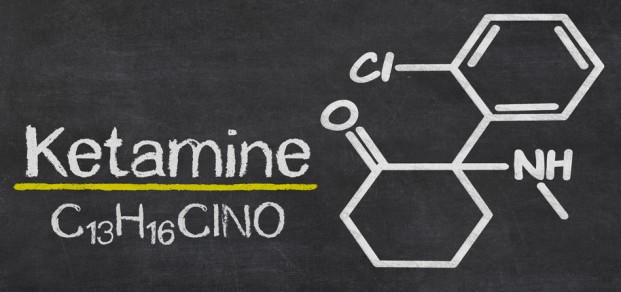Introduction
What comes to mind when you think of Ketamine? A drug of abuse? A horse tranquiliser? An anaesthetic agent? In reality it is all three. It usually has short-term hallucinogenic effects or causes a dissociative feeling (e.g. detachment from reality, sedation, or inability to move). However, with frequent use over time it can cause permanent problems such as ‘ketamine bladder’, resulting in pain and difficulty passing urine.
What we already know
Ketamine’s effects are mainly mediated via NMDA (N-methyl-D-aspartate) receptor antagonism, although it is also an agonist at some opioid receptors and interacts with various other receptors, including noradrenaline, serotonin and muscarinic cholinergic receptors.
It is a class B illicit substance and was, in fact, upgraded from class C in June 2014 following a review of its harmful effects. Ketamine (either intramuscularly or intravenously) is licensed for use as an anaesthetic agent in children, young people and adults, but over the last few years interest has been growing in the role of Ketamine as an antidepressant agent. It is not currently licensed for this purpose.
Areas of uncertainty
A study published in 2013 suggested that a single injected dose of Ketamine was associated with a rapid-onset antidepressant effect in patients with treatment-resistant depression (Murrough et al). The biggest challenge in terms of research with ketamine is that it remains tricky to compare against a placebo, given the fairly obvious side effects of taking a hallucinogenic drug, but this study compared Ketamine with Midazolam and this is probably the best comparator so far.
The following year, an open label study was published, which found similar antidepressant effects but a whole host of adverse effects were identified (Diamond et al), including anxiety and panic symptoms, increased suicidal ideation, vomiting, headaches and the anticipated feelings of detachment, confusion and dissociative symptoms.
There was a paucity of good quality information until, in 2015, a systematic review and meta-analysis of 21 studies showed that single ketamine infusions produced a significant anti-depressant effect for up to seven days. Beyond this time, there was no evidence to suggest a prolonged effect.
What’s in the pipeline
There is some evidence to suggest that Ketamine may also work for Post-Traumatic Stress Disorder and Obsessive Compulsive Disorder. Another proposed use for Ketamine (currently being researched at the University of Manchester) is as an adjunct for Electroconvulsive Therapy (ECT), potentially minimizing the cognitive impairments experienced post-ECT.
Ketamine remains one of the most promising new treatments for depression, both unipolar and bipolar, but it is not without its problems. Requiring specialist referral and a stay in hospital overnight for a single dose clearly has financial and logistical implications far beyond those of antidepressant tablets with a stronger evidence base behind them. We also need more information about safety and adverse effects, before it can be introduced to a wider market.
References
Coyle, C. M. and Laws, K. R. (2015), The use of ketamine as an antidepressant: a systematic review and meta-analysis. Hum. Psychopharmacol Clin Exp. [Abstract]
Diamond PR, Farmery AD, Atkinson S, Haldar J, Williams N, Cowen PJ, Geddes JR and McShane R. Ketamine infusions for treatment resistant depression: a series of 28 patients treated weekly or twice weekly in an ECT clinic (PDF). J Psychopharmacol, 0269881114527361, first published on April 3, 2014. [PDF]
Murrough, J.W.; Iosifescu, D.V.; Chang, L.C.; Al Jurdi, R.K.; Green, C.E.; Perez, A.M. et al. (2013). Antidepressant efficacy of ketamine in treatment-resistant major depression; a two-site randomized controlled trial. Am J Psychiatry, 170, 1134-1142. [Abstract]
Acknowledgement
Written by: Josephine Neale
Reviewed by: Helge Hasselmann, Alex Langford
Last updated: Sep 2015
Review due: Sep 2016


